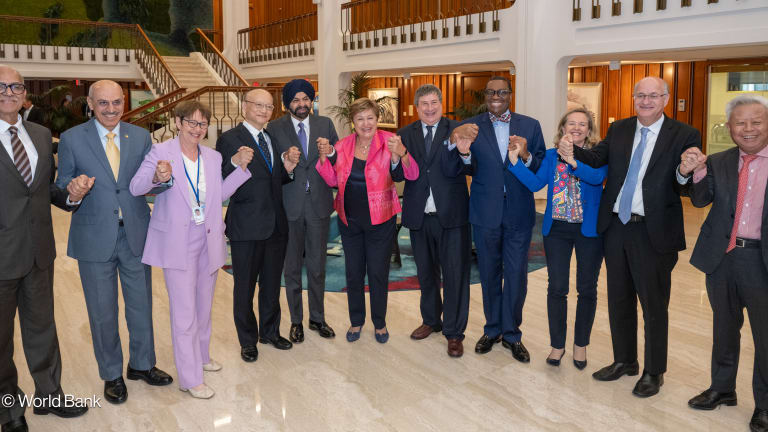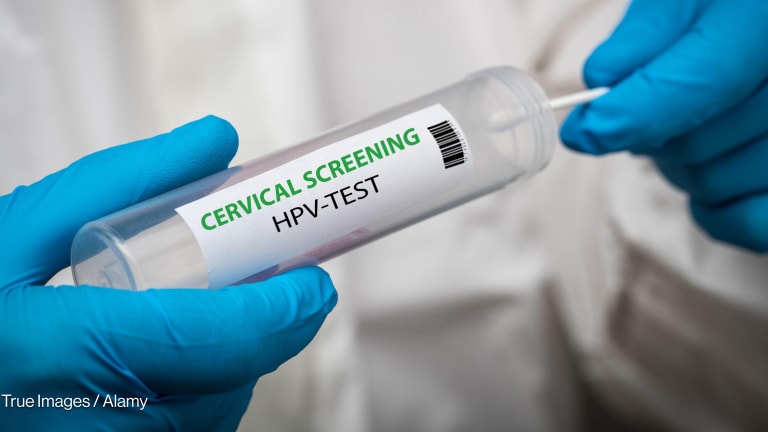
As the pandemic evolves, a key global effort to tackle the pandemic worldwide is also evolving and hopes to have a transition plan in place next month to continue its lifesaving work — rather than end it, as some have speculated for months.
The plan for the Access to COVID-19 Tools Accelerator, or ACT-A, a multilateral initiative launched during the COVID-19 pandemic, would identify what the initiative wants to do more of and less of as the world moves further away from an emergency response to the pandemic.
“What we'll do is for those things that we set up at the beginning … [that] we don't need any more, we'll get rid of. For those things that we don't need on a day-to-day basis, we'll put them on standby. For those things that we're not doing enough of, we'll start [doing more],” Dr. Bruce Aylward, who coordinates the work of ACT-A, told Devex.
This means ACT-A, which was set up to accelerate the development of lifesaving tools such as vaccines and ensure they are accessible to all countries, is consolidating its work, he said, rather than ending it — a narrative that has surrounded the initiative for months.
In a recent Devex interview, Dr. Ayoade Alakija, who serves as World Health Organization special envoy for ACT-A, attributed the confusion regarding ACT-A’s future to the initiative’s weak messaging.
Aylward said the work of ACT-A remains important, including on research and development, especially as the virus continues to evolve. There remains a “steady demand” for vaccines, he said, and it will continue to be a key part of ACT-A’s work. But the initiative also plans to increase procurement of and improve access to treatments.
The recent agreement announced between the Global Fund to Fight AIDS, Tuberculosis and Malaria and Pfizer on 6 million courses of Paxlovid, he said, is only just the beginning. There remains the Pfizer-UNICEF negotiations for up to 4 million treatment courses of Paxlovid. The initiative also awaits generic versions of the oral antiviral to become available.
But they will need to make sure that treatment deals translate to actual access on the ground and ensure it reaches countries that need it most.
“We have demand from … 47 countries for Paxlovid, or let's say an expression of interest. … But remember, that's not all the countries in the world, right? Which means there's still a lot of countries that won't have access, so we're gonna have to work with that as well,” Aylward said.
Devex spoke with Aylward about ACT-A’s future, why its work remains vital, and the risks the multilateral partnership faces in the coming months.
The excerpt below has been edited for length and clarity.
What does it mean that ACT-A is transitioning?
We put the ACT-Accelerator together very rapidly … We repurposed a bunch of international agencies and got them working together in an incredibly constructive way. However, it's ad hoc. Now, if suddenly there's something else, like malaria goes mad … and these agencies pivot and shift, part of the support for countries could collapse.
So when we talk about a transition plan, what we're being very clear on is this virus is changing. The world's approach is changing. Their perceptions are changing. Demand is changing. The ACT-Accelerator has to change. Just as the world is transitioning to accept [that] this is a long-term disease and virus, we have to as well. And the reality is we’ve got to figure out who's going to do the procurement. Is Global Fund … going to continue to be our backbone for tests and treatment procurement? Is Gavi, which is a childhood vaccination alliance, mainly going to continue to play this role? Is Unitaid, which was repurposed basically to help coordinate the therapeutics pillar, going to continue to do that?
We need the [over 100 countries that rely on ACT-A] to have a secure pipeline for the future. And that's what we're going to do during this period. And that's why when people say, ‘Is the ACT-Accelerator ending?’ God, no. The ACT-Accelerator is trying to consolidate for the long term.
What are the things that you’re going to get rid of, put on standby, and do more of?
It’s much more what are we putting on standby.
Let's look at just our own governance processes. What we're looking at is, do we need the council, which was established at the level of head of state … [to meet] on a regular basis? … Or should we adapt it and work at a lower level like through a task force arrangement or working groups that would allow us to then manage … [and] be able to reactivate … that high level political support [in case of a surge]?
Every Thursday night, we would meet. [Now] we look at, OK, can we meet bi-weekly during this period, because these guys also have to run the AIDS response in the world. We saw vaccination levels have dropped. We gotta get those back up. Everybody has other agendas. So we're looking at which things can we run at a slightly different pace.
People are saying: Should we dial back the work that we're doing on the [research and development] side? That would be a huge mistake. The virus is still evolving. We have one or two drugs at work. Tests have got to be tweaked all the time … [and] we need more robust vaccines and get more durable protection. So the last thing you want to do is cut back the R&D. So we'll continue that as well. But you know, within every one of those areas, [we’re] refining it as well.
“So when we talk about a transition plan, what we're being very clear on is this virus is changing. The world's approach is changing. Their perceptions are changing. Demand is changing. The ACT-Accelerator has to change.”
— Dr. Bruce Aylward, coordinator, Access to COVID-19 Tools AcceleratorI want to be a little bit careful [about] making a big long list of what [each pillar under ACT-A] is going to start, stop, stand by. They need to go through their process. And that’s why our goal is [by the] end of October or middle of October to have the full plan in place.
But … it's not like we're going to stop supplying vaccines. We're not going to stop supplying tests and treatments. There's nothing at that level.
A lot of what we did in our previous budgeting and work was really supply side budgeting, like here's how much money we need to get … every single case treated [and] tested. But now we're in a world where we have an awful lot of demand information. And so what we are able to do is adjust our budgets and costs to what is the actual demand, plus what are the scenarios and if we have these surges in disease. But we would do that under emergency appeals rather than part of the base budget.
Will everyone be staying in the partnership or will you be seeing some moving on and other new organizations joining?
For the period, we will definitely be maintaining the same partnership.
Even saying that though, when we set up the partnership, we had two lead agencies called co-convening agencies for each of the four pillars. And then over time, what we did was some of those changed, like one may be replaced by one of the others because we're making a bigger focus on delivery, so let's get UNICEF more involved, for example, on the COVAX piece of it.
So there's been a slight degree of evolution, let's say, as we've gone through. But as we've done that, it's more who's leading on things rather than anyone leaving. And we won't see that definitely in the next six-month period. Everybody signed up for this. But it's a risk, right? Because they have other demands and needs. And that's part of the reason you have to change and adapt to the way these things are evolving.









